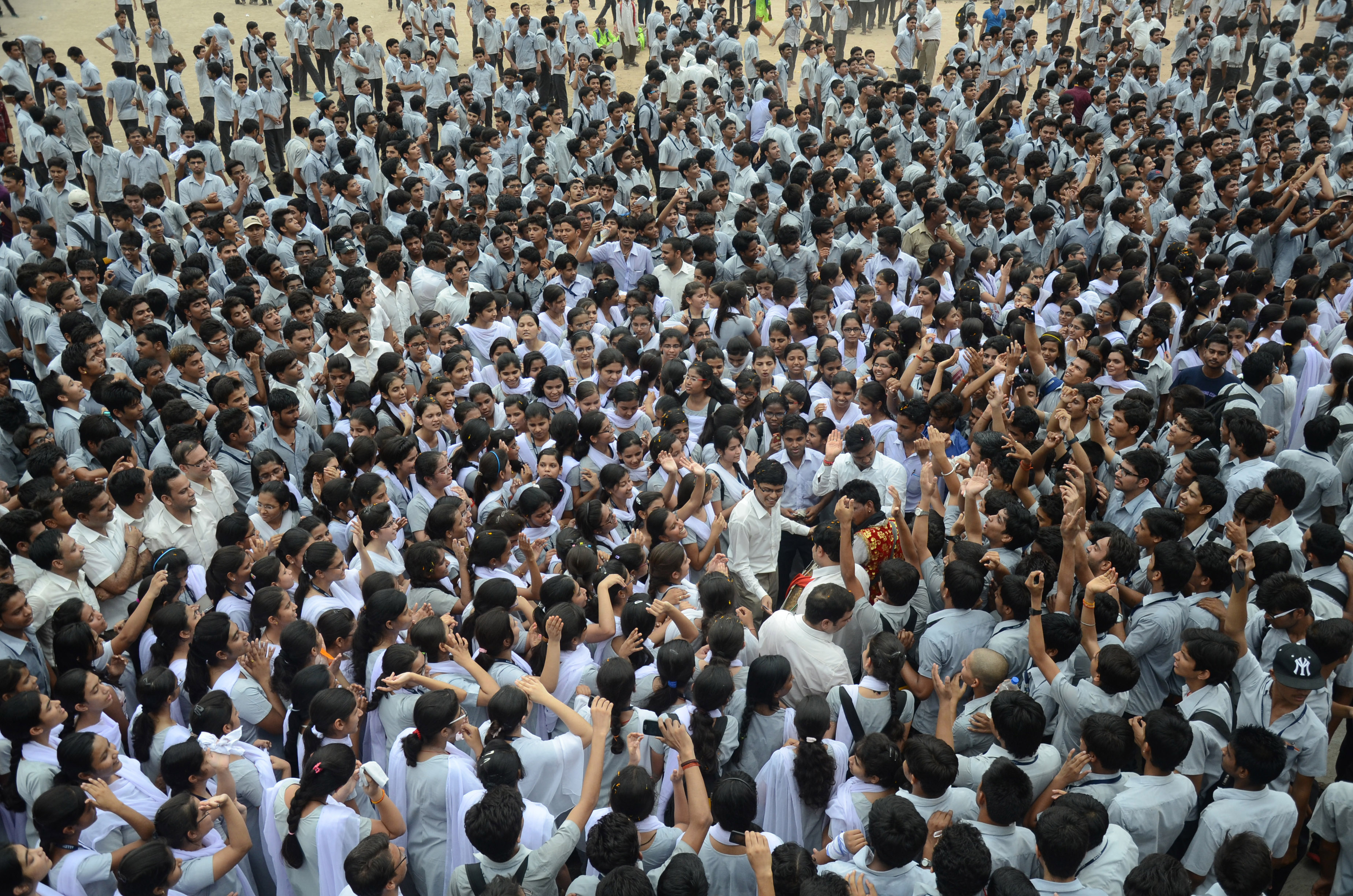
The suicide of three students within a span of 12 hours at Kota in Rajasthan has again brought into focus the plight of young adults who are labouring under the load of other people’s expectations
Recently, the suicide of three students within a span of 12 hours in Kota in Rajasthan made the headlines in the media. The three students, all boys, aged between 16 to 18 years, chose to kill themselves because they could not cope with the pressure they were under in a highly competitive environment where the emphasis was on succeeding and not enough care is taken to ensure the students’ happiness and emotional strength. The reason why their suicide made the news was because their deaths came within hours of each other. Otherwise if the numbers are anything to go by, there have been 15 deaths in the coaching town till now. And who knows, by the time this article is published there would have been a few more unsung, unnoticed deaths in Kota by a few more innocent souls unable to shoulder the burden of their parents’ unreasonable expectations or unable to cope with the crashing of their own aspirations and dreams.
And now we are inching toward the dreaded Board exams for students of Class 10 and 12 that are slated to start from mid-February. All around me I see worried parents with grim faces denying themselves all social contact because their ward will be sitting for the Board exams soon. The children who are preparing for the Boards are mostly slinking about with slumped shoulders as they carry a huge burden of responsibility of making a career for themselves and the unreasonable expectations of their parents on their frail shoulders.
While the bright ones are whipping themselves to perform even better and achieve that magical 100 per cent, the mid-level performers are doing all they can to improve their performance. And the below average student and their parents are virtually going through hell this time of the year. Some are even suffering breakdowns and a feeling of worthlessness along the way.
Relationships between parents and children are soured, with the students feeling worthless and the parents wondering where they went wrong. In some cases, the parents are arguing and blaming each other and nerves are frayed.
In schools, the teachers of higher classes are fretting over what the results will be this time for the boards. Tuition teachers are also under immense pressure to ensure their wards come out with flying colours. All this worrying and nail biting by the school managements, teachers and those giving tuitions is not because anyone cares about the children and their future or mental and emotional health. It’s because in our country education has become a business worth crores and how much money schools and tuition teachers can squeeze out of parents depends on how the children perform. The Guru-Shishya tradition that we Indians have always been so proud of has been lost to materialistic aspirations of schools, coaching institutions and private tutors.
Sadly, in all this, the parents’ expectations, the schools’ ambitions, avarice and the coaching institutions and tuition teacher’s lust for lucre, and deciding the worth of our students by the grades and the higher educational institutions they get in, we are killing our children.
As parents and teachers it is our first and foremost duty to look after the mental and emotional well-being of our children. It’s our duty to bring up well-adjusted, secure and happy humans who have good moral values and a humane nature who are also capable of making a reasonably successful living for themselves.
But sadly, what we really bring up is burdened and disturbed young adults who are labouring under the load of other people’s expectations, ambitions and worst of all the fear of “what will people say if you don’t take science and maths and go into humanities” syndrome that most Indian parents are afflicted with.
In all this, no one cares to ask the child what s/he wants. What their dreams and aspirations are. Or if they are even able to cope with the burden of education that we cast on them or in some cases they themselves take on, in order to fulfil their overambitious dreams.
It’s no wonder then that the mental and emotional health of our children is suffering. Depression, anxiety, eating disorders, sleep disorders, behavioural issues, aggressive behaviour, substance abuse are commonly reported conditions in adolescents and young adults in India. Every parent’s worst nightmare i.e. death by suicide is the third leading cause of death among young adults and is a significant problem among high school and college students in the country.

Unfortunately for our student population, mental health remains a low priority with parents and teachers alike. Hence, it remains undiagnosed and even when parents become aware that their children are showing signs of extreme mental stress and worrying behavioural changes, they are reluctant to seek professional help for their wards primarily due to the stigma attached to it or lack of proper information.
In fact, an eye-opening study by the renowned National Institute of Mental Health and Neurosciences (NIMHANS) has revealed that stigma inhibits nearly 80 per cent of those afflicted from receiving therapy themselves or getting treatment for their loved ones, despite facing mental health issues for over 12 months. This alone is an alarming statistic, given the social and economic impact of poor mental health and the rise in cases of crimes owing to lower thresholds of tolerance and an increasing number of people suffering from hair-trigger tempers.
Sometimes it is the parents’ own inability to come to terms with the fact that their child is facing mental health issues that prevents them from seeking the help of professionals to counsel the children. Even today most parents in India believe that “yeh stress-wess sab nakhra hai. Ek thappad maro sab akal thikane aa jayegi. Hamare zamane mein toh yeh sab nahi hota tha. (This talk about stress in children is all nonsense. One slap will fix everything. We coped with all this in our times and there was no counseling.)” This attitude is not something that is limited to the lower middle class; it is as prevalent in the upper middle class too. The super rich, too, suffer from such crippling ignorance or ego that prevents them from seeking help for their wards.
It’s no wonder that a recent Indian Council of Medical Research (ICMR) survey revealed that 12-13 per cent of students in India suffer from psychological, emotional and behavioural conditions.
Therefore, it’s vital for parents to teach their children not just to be successful but to be well-adjusted and happy individuals as well. So if in order to be able to do that you need the help of a professional counselor along the way, then so be it. There is no shame in going for therapy. In fact, the shamers should be ashamed of themselves.
Also, our focus should not be on material things but in teaching our children that even though it is important to have a career and be financially independent, creating a healthy work-life balance is vital too. Having and nurturing hobbies and interests in life is vital for emotional and mental well-being.
No one is saying that don’t push your children to do better and focus on their careers. Do motivate them, but don’t shame them if they fail. Help them to get up and try again. Remember, this present failure is just a bump on the long road of life that your child has to traverse.
Also, don’t push your dreams and aspirations on your children. Your definition of success may be your child becoming a doctor, or an actor or a famous cricketer or financial wizard, whereas your child might be inclined to becoming a teacher or social worker. Or you might want your child to be a lawyer and he might find becoming a dentist more satisfactory or becoming a chef or a veterinarian or interior designer or a deep sea diver or a car designer.
The thing is that most parents fail to realise that they have lived their life, now it’s time for the children to live their own life. They have the right to their own dreams, aspirations, passions and interests. What is good for you might not be good or satisfying for your offspring. They might have a different world view which might be starkly at variance from yours.
Just monetary success is not the measure of your worth or success, the amount of happiness and contentment you have in life matters to a very large extent. You may be the most successful person but if you are lonely, depressed or unhappy or worse DEAD, what use is all the wealth in the world to you?
Sadly, India’s ranking in the World Happiness Index has been falling each year and now we have got the 136th rank out of 146 nations. Some of the variables in the report apart from the usual per capita GDP related ones are Real Social Support, Generosity and most importantly, Freedom of Choice in One’s Life. Given that our happiness index is going south, more and more Indian schools need to focus on teaching children happiness like the “Happiness Curriculum” that is being taught in Delhi Government schools.
Else, we are destined to be a nation where 14 per cent of the young population is depressed, one in every six person suffers from mental health issues and the suicide rates of students are going up each year. Shockingly there has been a 17 per cent rise in suicide cases between 2019 and 2021 in India overall, not just in students. A 2021 UNICEF survey also found that around 14 per cent of 15 to 24-year-olds in India, or around one in seven, reported often feeling depressed or having little interest in doing things.
We have to realise that if a person is happy they will succeed in whatever they do. At the end of the day parents have to realise that the career choice of their children is here for life. Once the young person gets into a career stream s/he has to do the same thing till they retire 40 years on. So isn’t it better for our children to discover what they want to do on their own so that they choose a career stream which is of interest to them.
Extreme parental pressure to do well academically and to choose a career path that is lucrative has led to a generation that is depressed, has anxiety, low self-esteem, no contentment and mental health issues. Our children are suffering from behavioural and rage issues. Suicides among students are also increasing each year. Isn’t it time we realise that this aspirational parenting is killing our children. We must let our children dream, choose and fly. We are just here to shepherd them and provide the best care, facilities and environment to grow that we possibly can. Each child is a unique individual and not our carbon copy. So guide them along, but let them do as well as they can. Don’t let your unreasonable aspirations push your children to suicide.













